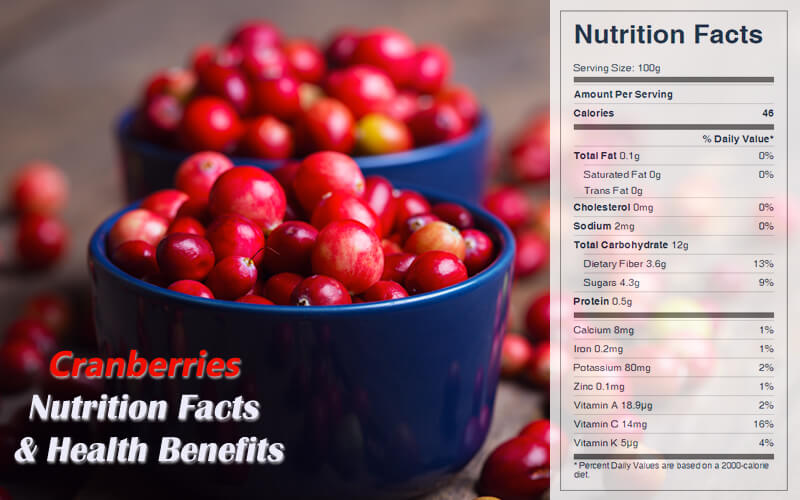Fresh Cranberries Nutrition Facts and Health Benefits
Anyone who has eaten a fresh cranberries knows that these native North American fruits have a unique taste, cranberry sauce is a traditional accompaniment to turkey at Christmas and Thanksgiving dinners. They also have some unique nutritional benefits, here are nutrition facts & health benefits of raw cranberry.
Raw cranberries are 87% water, 12% carbohydrates, and contain negligible protein and fat. The berries are high in vitamin C; but iron, vitamin A, and potassium are among their other nutritional assets. Cranberries have one of the highest ORAC levels among the 277 foods tested by the USDA.
From a nutrition standpoint, cranberries are high in vitamins B-1, B-2, B-3, and B-6, and they are a good source of vitamin C. They are rich in bioactive polyphenols, and they contain more than 150 different bioactive compounds.
Raw Cranberries Nutrition Facts Label
Health Benefits of Fresh Cranberries
Cranberries are relatively low in sugar and carbohydrate, that means that cranberries and cranberry juice can bring the benefits of fruit to those who must limit carbohydrate and sugar.
Three flavonoid classes stand out the most for cranberries: anthocyanins, flavonols, and proanthocyanins. These flavonoids give cranberries their antioxidant and antiinflammatory functions.
When most people consider the health benefits of cranberries, avoiding urinary tract infections comes to mind. These little superfoods do so much more than prevent UTIs. Cranberry juice both treats and prevents urinary tract infections. It’s not the acidity of the cranberries that does the trick, but their natural mucilage, which sticks to the walls of the bladder and its associated structures. This mucilage prevents bacteria from lodging in the tissues and causing chronic and recurrent cystitis. In a number of trials, cranberry juice has been used to treat urinary tract infections over prolonged periods with no marked side effects.
Cranberries have also been found to strengthen our immune function by increasing T cells and B cells.
These little berries support our detox pathways and reduce inflammation. As cranberries ripen, their anthocyanin content increases, contributing to their rich red color. Cranberries are high in the flavonol quercetin. Several in vitro studies have found that these flavonols suppress the activation of macrophages and T cells exposed to pro-inflammatory stimuli. In other words, when we are exposed to inflammatory stimuli, such as food additives and pollution, these constituents in cranberries prevent our immune system from reacting, helping to reduce the chronic inflammatory state most people are in. Beyond their antimicrobial properties, proanthocyanins lower concentrations of TH2 cytokines and increase IgA—which helps to improve leaky gut. Some animal models have found that cranberry extracts can reduce C-reactive protein (CRP), the main marker of systemic inflammation, as well as other pro-inflammatory interleukins.
Research also suggests cranberries are beneficial for gut health. Cranberry procyanidins appear to inhibit the stickiness of bacteria, that same anti-adhesion property gives cranberries a role in preventing tooth decay, and possibly even the bacterial infection implicated in many stomach ulcers.
Cranberries are high in oxalic acid, oxalates are a family of substances that bind with metals and minerals such as calcium, magnesium, and iron to form crystals in the body—sometimes in the form of kidney stones. Healthy people usually have no problem eating these foods in moderation, but cranberries and other foods high in oxalates can cause problems for those with kidney disease, gout, or rheumatoid arthritis.
